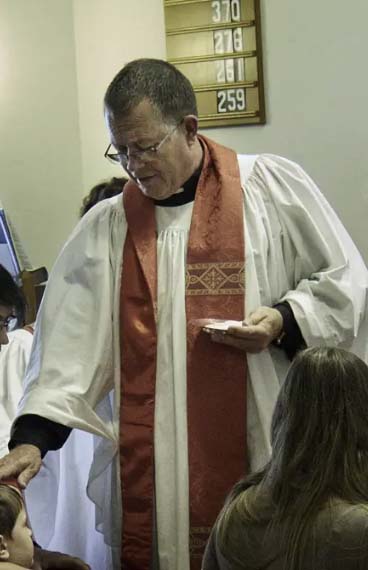Have you ever asked yourself the question “why should I pray?”
May you've thought, “God is up in heaven and He’s got everything planned out and He’s controlling everything. So what difference do my prayers make?” In other words, “Why should I do anything if God‘s got it all figured out and will make His will happen?”
We're going to discuss those questions today.
The Simple and Not-So Simple Answers
First, let's tackle why you should you pray. One simple answer is that we pray because Scripture commands us to. Another simple answer is that we pray to be more like Jesus, who gave us the example of continual prayer.
Sometimes, however, simple answers don't seem to be enough.
If you’ve walked with the Lord for any length of time, you've probably thought, “do my prayers really make a difference?” This may be especially true if you don’t see an immediate positive answer to some big issue in your life and you’ve been praying really intensely. When those thoughts come, we can be very tempted not to want to waste our time or get our hopes up.
These temptations should not surprise us.
Prayer is when we communicate with God. The devil hates us talking to and listening to God. I certainly wouldn’t judge anyone for having these kinds of thoughts!
I confess that—even though I try to pray for almost everything, without ceasing—I sometimes feel that my prayers don't even get past the ceiling. When that happens, I remind myself of what is written in the fourth chapter of Saint James's epistle, “you do not have, because you do not ask“.
Looking at these questions, we need to distinguish between what the Bible teaches about God‘s sovereignty or his providence versus the common idea of determinism that incorrectly teaches that God‘s sovereignty simply means that God controls everything last thing.
You can be sovereign in the situation, but also be willing to give choice to another. God gave the ability to choose good or evil. Because of the fall of Eve and Adam, we are enslaved by sin. However, through the grace of God, we are offered the opportunity at the right time to choose to follow God.
Take the example of a parent, who is the master of their own home and has young children. Imagine that the parent, through a closed circuit video system, can see everything that happens throughout the house. Imagine that this video system is so effective that nothing escapes the parent’s awareness.
The parent can decide to give the children freedom... Allowing them to choose what TV shows to watch, what snacks to eat, and what time to go to bed. The parent may give guidance or set rules to help the children make good decisions, but the parent can allow them to break those rules to help them learn deeper lessons. The parent may even choose to intervene if the children go so far beyond the parents, guidance and commands that the overall plan of the parent would be disrupted.
At the end of the day, the parent controls the situation so that the parent's larger plans are accomplished. The parent try to make sure that nothing happens in that house outside of their control, but they aren't actually going up into the children’s rooms and forcing them to do certain things against their will.
Determinism is different.
The Trouble with Determinism
Determinism teaches that God controls every single aspect of this world and in our lives and that we have absolutely no control over it. Extreme views of predestination move into the realm of determinism.
Determinism can even lead to fatalism, which generates an attitude of giving up because our actions make no real difference. Determinism can erode our willingness to pray by generating unhealthy, entitled attitudes. “Why should I even pray, plan, or work if God is going to provide for me anyway?”
For example, I’ve had friends who wished to marry, but they made little effort to find a spouse. Why? Because they genuinely believed, if God already selected the person that they'd marry, God would make it happen. Sometimes they've felt God has even indicated who that spouse was going to be.
They then went further down that line of thinking. "If God has already promised me that person as a spouse, why get in God’s way?" They genuinely believed that God was going to send that person to them, and they (and the prospective spouse) had no choice on the matter.
On the other hand, if God has decided that they are not going to be married, it doesn’t matter whether they choose or try to search for a wife.
The foolish concept of determinism can intrude in any part of our life, health, work, and even doing outreach and evangelism. If a Christian believes that God has already decided every person that will be saved or not be saved, then why try to convince them to make a choice they don’t even have?
God can intervene, powerfully and miraculously, to accomplish a specific purpose.
But examples throughout history and Scripture seem to show that not every last decision is controlled by God.
Scripture doesn't teach determinism.
The Bible teaches God’s sovereignty and providence.
The Scriptures teach that, through the completed work of Jesus Christ, the Father in Heaven hears our prayers.
Scripture teaches that God responds to our prayers and at times He even changes His mind. The nature of God is unchanging, but how God executes His larger plan sometimes does.
The God Who Hears... and Responds
The second major consideration on why we should pray that I want you to think about is that — again and again — God responds to the prayers of His people.
In Exodus chapter 32, God was getting ready to destroy His people because they were at the bottom of Mount Sinai worshiping a golden calf. But then Moses interceded on behalf of the rebellious people. Moses prayed, and God changed His mind.
The Bible says God relented from destroying His people. This clearly documents God's response to the intercession of Moses on behalf of His people. That’s not the only case with Moses.
In Exodus 15 and Numbers 11, we see Moses once again praying for food and water whenever they were in the wilderness. Moses clearly believed that God could change His mind.
There are many examples in the Scriptures that show that God does answer His people with miracles, large and small.
I’m not saying that God will always do the same thing for you, but I am suggesting is that God continually — again and again — shows us in the Scriptures that He responds to our prayers.
There's power in prayer, but sometimes we have to be persistent to see the results.
The Importance of Persistence
We need to believe that our prayers have an effect to change the world through the power of God.
Jesus taught the value of not giving up in prayer when He shared the parable of the persistent widow and the hard-hearted judge in Luke 18.
I believe Jesus is saying, “I’m teaching you this parable so that you always pray and never lose hope."
Sometimes, it's easy to just give up on prayer if we pray for something for a week, or two weeks, or three years, and it doesn’t come to pass. I've prayed for things that God took decades to answer, but He answered.
I do this, even though sometimes God has already decided that His answer will be a resounding NO.
I believe strongly that we should pray earnestly — hopefully — until God says no.
We are to go forth confidently, asking God for whatever it is that we want Him to do for us, but prepared to bow to God’s will for our life regardless of His answer.
If we want to be like Jesus, then we must always remember that Jesus prayed and His humanity, having emptied himself of all godly power, utterly dependent on the love of our Father in Heaven.
If we are going to model our lives on Jesus as example, we cannot say that our prayers won’t make a difference.
There is much about prayer that will remain a mystery, until after we are resurrected, and know God even as He knows us.
We don’t really understand how our prayers are going to mix and combine with God’s sovereignty. Of course, that lack of understanding doesn’t make a difference on whether prayers are effective or not.
The answer of the prayers comes from God who, in His perfect understanding, knows our hearts and what is best for us.
When Jesus walked the earth as fully human, Jesus wasn’t trying to figure out whether His prayers were going to somehow make a difference. Jesus was obedient. Jesus trusted our Father in Heaven as loving and good. Jesus set an example for us to follow whenever He'd sneak away to places of solitude to pray. He also set an example when He prayed publicly, so others would hear His prayer.
If Jesus, the son of God and the King of kings, had to pray to His Father,
then you and I need to pray all the more.
We must not give up on prayer if we say we want to be like Christ. We need to seek to have humble but fervent prayer, which is the type of prayer that God responds to.
God desires to show us His love and His power.
Our job is to be faithful and pray for the things that we believe that God has for us, but also to pray all in accordance with God‘s will, and as importantly, pray for other people and intercede for them. Loving others as we love ourselves.
I believe God wants us to get serious about prayer and — just like that widow — we should be persistent in prayer and never give up. So let’s just do it!
Amen.




